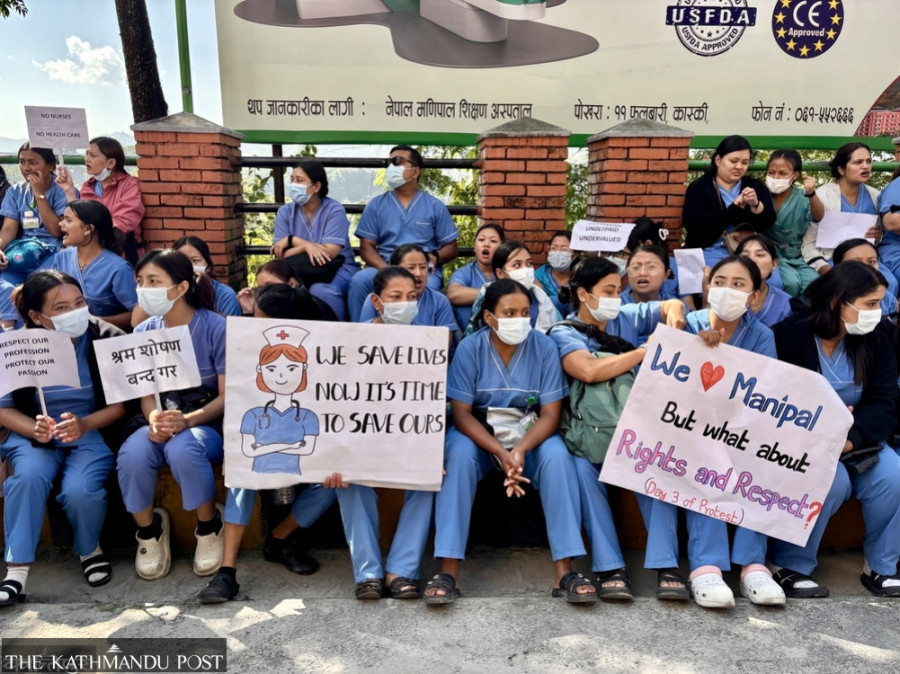Editorial
Nurse their wounds
Nurses in Nepal are woefully paid. This exploitation of these essential healthcare workers must end.
In any emergency, nurses are the first to respond. Their work routine entails long and unpredictable hours, a heavy workload as well as physical and emotional strain. Yet they relentlessly work to ensure the safety of patients. Acknowledging this dedication, nursing is called a “noble profession”. But in Nepal, it is grossly undervalued, with nurses at private hospitals being unfairly compensated and disrespected. Their earnings range from just Rs15,000 to Rs20,000 a month, which is far from sufficient to support their livelihood. For this very reason, nurses at Manipal Teaching Hospital in Phulbari, Pokhara, have been on strike since October 10, with nurses from the other two major hospitals—Gandaki Medical College (GMC) and Charak Memorial Hospital—following suit. Now, the protest has fanned out to Biratnagar’s Birat Medical College Teaching Hospital.
With support from the Nursing Association of Nepal, the nurses are demanding that private hospitals pay salaries at par with government nurses following the Health Ministry’s December 12, 2024 directive to set a monthly minimum wage of Rs34,730 for all nurses and healthcare workers. However, hospitals have declined the pay scale, citing financial constraints, the investment model of private hospitals and the service operation system. At both Manipal and GMC, poor and insured patients have suffered as the standoff has dragged on.
Fair and dignified remuneration for nurses is often discussed in Nepal, and the recent strike has again laid bare unfair compensation practices in Nepal’s medical sector. To reduce operational costs, private hospitals often hire, for years, low-paid nurses and trainee nurses, leading to their exploitation. As successive governments have failed to ensure a minimum wage for nurses, private hospitals took full advantage of the loophole. Nurses suffered the most during the Covid-19 pandemic. They worked tirelessly day and night, but when the pandemic subsided, many were denied timely payment and laid off. Such exploitation of their labour is unethical and unacceptable. The situation, regrettably, remains the same.
It is high time to rethink the wage issue in private hospitals by prioritising investment in the health and care sector. As experts suggest, an insurance reimbursement mechanism, rather than an out-of-pocket system, would lead to steady cash flow to hospitals. This in turn could lead to better pay for workers. Another way to mitigate the exploitation of nurses is to mandate private hospitals to abide by the Nepal Health Service Regulations, which stipulate that health workers should not work over 40 hours a week. If there are more work hours, they should be compensated and be able to claim additional service leave.
In the light of these events, last week, the Sushila Karki-led government instructed authorities to promptly heed the concerns of agitating nurses. The government, on Sunday, also formed a 14-member committee under the health ministry additional secretary to address their demands. The committee is expected to recommend both short-term and long-term solutions to the problem. This is commendable. But as services at Pokhara hospitals have been highly affected, and the two parties are yet to reach an agreement, it would be wise to remind them of people’s fundamental right to uninterrupted health services. Nurses’ genuine demands are understandable and must be urgently heeded, but the protest shouldn’t hinder patients from receiving medical care.
If nurses’ labour is not acknowledged on time with fair pay and respect, their exodus in search of better opportunities abroad will only increase. This will be disastrous for the country’s already struggling health care system—which is among other things characterised by an acute shortage of trained nurses.




 9.7°C Kathmandu
9.7°C Kathmandu














